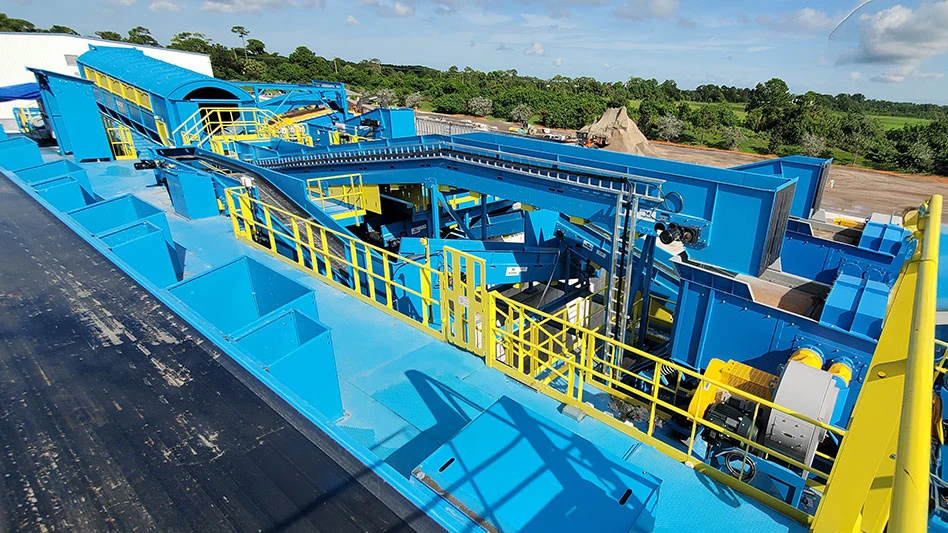 The international flow of recyclables from generation point to end markets continues to be, at times, a difficult proposition. The struggling global economy has provided some of the challenges. However, any improvement in business also is being hamstrung by a plethora of policies, regulations and legislative programs that are providing a separate set of frustrations and barriers for the recycling industry.
The international flow of recyclables from generation point to end markets continues to be, at times, a difficult proposition. The struggling global economy has provided some of the challenges. However, any improvement in business also is being hamstrung by a plethora of policies, regulations and legislative programs that are providing a separate set of frustrations and barriers for the recycling industry.
Asia-Pacific Concerns
Over the past several years China has made up an ever-growing portion of the consuming market for secondary commodities, whether fibre, plastics or metals. This was all good when the Chinese economy was growing at a double-digit clip and many recyclers had no problems shipping materials into the country, including some shipments that were a bit suspect.
This ever-growing demand for all things recyclable, however, has more recently started to take a decidedly downward turn. The slowdown is partly due to a softening Chinese economy, but also because of the country realising that it needs to do a far better job of improving its environmental credentials.
Several exporters note that not long ago, when some Chinese ports in the northern part of the country were cracking down on suspect shipments, container shipments found their way into the country through ports in the southern portion of the country.
The first step to get better control of the recyclables flowing into the country was the instituting of the General Administration of Quality Supervision, Inspection and Quarantine (AQSIQ), which was established in 2001. Despite the implementation of AQSIQ procedures the next several years, especially as markets strengthened, there were a host of reports of loads of “recyclables” that were later found to be solid waste or other non-recyclable materials. This occurred despite the shipper having the requisite AQSIQ certification.
This situation appears to be changing. Over the past several months a number of exporters have pointed out that China is taking a far more aggressive stance to prevent questionable loads of material from entering the country. Even southern China, which was the route where many shipments went to escape significant scrutiny, has become a more difficult port to ship into. Adding to the increased inspection, a number of exporters say that duties are increasing, adding to the overall cost of shipping into these ports.
Several scrap metal recyclers say this change is not part of any new legislation, but rather an attempt by the Chinese central government to strengthen the existing laws over importing. In response, anecdotal reports have been coming out that many loads of mixed materials are being rejected at various ports, while several exporters say that duties and charges have increased significantly. The overall impact is that the increased enforcement of policies has resulted in extending the time it takes to deliver containers from the vessel to their final destinations.
Another factor that has created significant problems for exporters to China has been theft from containers once they reach China, especially from inland waterways in the southern part of China.
The issue has become so significant that the Bureau of International Recycling (BIR) has contracted with the International Maritime Bureau (IMB), one of three bureaus that form Commercial Crime Services, an anti-crime unit of the International Chamber of Commerce, to look at steps that recyclers can take to reduce the problem. The recycling association will test out the service for a trial period until June 2013. (See the related news item on page 14.)
Under the arrangement, the IMB will collate incidents in regard to container shipments, in particular fraud and theft. According to BIR, the sharing of the information has been effective in reducing risk in other membership sectors of the IMB. Once reports have been verified and recorded, details will be available to BIR members upon checking. Any information passed to the IMB will be treated in strict confidence and the anonymity of the BIR member maintained. In some cases, IMB will circulate alerts.
The recent devaluation of the Indian rupee has created some stress on exports of various recyclables to India. Recyclers say that because of the sharp change in India’s currency value, the cost to ship to the country has climbed by as much as 20%, making it a far more expensive proposition to ship material there. The rising cost has closed off the country to many shippers.
Also making it a more challenging environment to ship material to India, one exporter who does a significant amount of business with India says, is that the country is becoming much more attentive to potential environmental liabilities.
Electronics in Europe
Increased recycling of electronic scrap has been one of the bigger trends in the European recycling industry. One of the conditions that has helped grow the recycling industry on the continent is that the European Parliament has tightened disposal requirements even more to further increase the recycling of electronic scrap. Under new rules — approved by the European Parliament in January and the European Council in June, 2012 — starting in 2016 countries will be required to ensure that 45% of electrical and electronic equipment sold in each country is collected for recycling.
 That figure rises to 65% collection of all equipment sold by 2019, or an alternative measure of 85% of all waste electrical and electronic equipment (WEEE) generated in the country.
That figure rises to 65% collection of all equipment sold by 2019, or an alternative measure of 85% of all waste electrical and electronic equipment (WEEE) generated in the country.
Currently, one-third of WEEE in the European Union is collected under an existing system that targets about 9 pounds of electronic scrap per person per year — about 2 million tonnes per year out of around 10 million tonnes generated per year.
According to Ross Bartley, the environmental and technical director for the BIR, a key concern of the moment for the recycling industry is the Extended Producer Responsibility (EPR) scheme. Bartley notes that most EPR schemes operate nationally, but have wider implications. In particular, multinational producers that sell into very many different national markets are affected, as well as affecting those collecting, sorting and processing recyclables that come under any particular EPR scheme.
However, he asks, does the solution to the global problem caused by the absence of electronic scrap management, high on the agenda of the United Nations Environment Programme Basel Convention in its mobile phone and computing equipment initiatives, depend on national EPR schemes?”
“Particularly in these difficult economic times, nationalism gains ground,” says Bartley. “So national governments are more receptive to listen to arguments from their home industries that exported scrap is a lost opportunity for them to expand their business and so policies to favor national scrap consumers gain ground and threaten to constrain the profitability of scrap exporters. Or are local downstream metal fabricators a pre-requisite for a healthy national hot metal-working sector?”
In a statement, Janez Potonik, the European Union’s Environment Commissioner, said, “In these times of economic turmoil and rising prices for raw materials, resource efficiency is where environmental benefits and innovative growth opportunities come together.
“We now need to open new collection channels for electronic waste and improve the effectiveness of existing ones. I encourage the member states to meet these new targets before the formal deadline,” Potonik added.
According to supporters, the compromise on new rules garnered broad support across the EU’s political parties, but was opposed by consumer electronics retailers, who say they will end up bearing the responsibility of collecting and transport the obsolete electroncis. Part of the directive is a retailer take-back plan under which “big box” electronic stores will be forced to accept old equipment for free and without buying a new product.
Backers claim the new rules will help businesses by making a uniform policy across the European Union.
Reclassifying Material in Italy
A law passed earlier in 2012 in Italy that could have a significant negative impact on the flow of recyclables from Italy to other countries was recently halted. According to attendees at the spring BIR conference, as initially written the law stipulated that at the point of customs clearance, there must be a declaration from the destination country that it possessed a recycling system with standards similar to those of Europe. As a result, “It became difficult if not impossible to export any kind of scrap out of Italy,” said Surendra Borad with Belgium-based plastics recycling firm Gemini Corp.
At the same conference, Stefano Fiore of Italy’s Logistics Group Srl said current EU legislation on transboundary movements of waste “is interpreted and applied in Italy differently from the other member countries.” Even though the above-mentioned Italian law was swiftly repealed, “many other problems remain,” he warned. “Until the difference between waste for disposal and waste for recovery is clarified within the Italian mindset, there is very little possibility that this sector will come into line with the operations of other member countries.” As a forwarding agent, his biggest problem is “the constant feeling of uncertainty caused by the overly free interpretation of the laws in force,” said Fiore.
European Plastic Project
After two years of work, a group of European companies and associations, including European Plastics Recyclers (EuPR), European Association of Plastics Recycling and Recovery Organisations (EPRO), European Plastics Converters (EuPC), EuPET and Recovinyl, have released EuCertPlast, which has resulted in implementing the existing CEN (European Committee for Standardization) standard 15434 on post-consumer plastics recycling.
The goal of the EuCertPlast certification system is to recognize plastic recyclers operating to give confidence to suppliers that any input plastic scrap they deliver to a certified recycler will be recycled according to the highest standards with respect to environment protection and national legislation.
One of the main components of the certification, according to the EuCertPlast scheme, is to evaluate the system’s suitability for processing specific materials.
The author is senior editor of Recycling Today Global Edition and can be contacted at dsandoval@gie.net.
Latest from Recycling Today
- Greenwave raises revenue but loses money in Q2 2025
- Recycled steel prices hold steady
- EY says India’s need for scrap imports will continue
- Coming full circle
- Amcor, DCM introduce fertilizer packaging with 35 percent recycled content
- Comstock Metals gets closer to commissioning commercial-scale solar panel recycling facility
- Washington selects Circular Action Alliance as PRO
- Smurfit Westrock expands in Latin America





